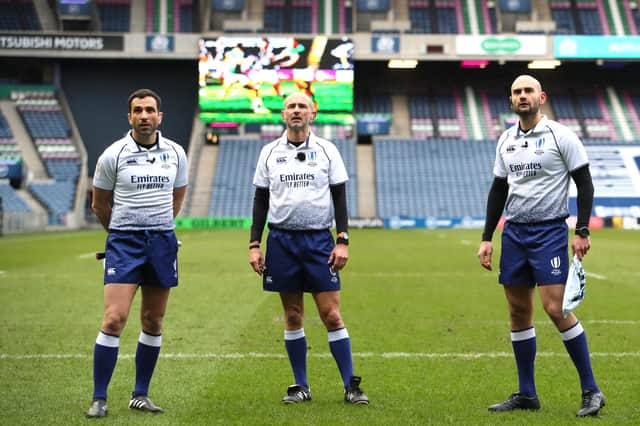Allan Massie: The idea of the Captain’s Challenge is deplorable - we already have too many TMO referrals


The news that some law revisions, already the subject of experiment in the southern continent, will get their airing in the Rainbow adds some interest to this improvised tournament. One, I should say, seems to me deplorable. This is the Captain’s Challenge, “aimed at enhancing the accuracy of decisions already within the remit of the match officials.” The circumstances in which the challenge is permitted are spelled out, each captain being allowed one in a match, though if my reading is correct, a successful challenge leaves the captain with the right of another.
Now, while I accept that foul play which has gone unremarked may embitter the side that is aggrieved, we surely have too many stoppages, too many references to the TMO already, without inviting more.
Advertisement
Hide AdAdvertisement
Hide AdThe proposal that a substitute may be sent on for a red-carded players after 20 minutes seems fair – and not only because anyone who has got a red card is all but sure to be suspended subsequently. Twenty minutes is quite a long time – a quarter of a match – to be a man short. Dismissal from the field punishes the team as well as the individual, and if the red card is given early in the match, the punishment for the team is severe.
The trial law which makes for the biggest and, in at least one case, fairest change is that which introduces the goal-line drop-out. This will be awarded to the defending team if the ball is held up over the goal-line, if an attacking player knocks on there, or if a defender touches down a kick ahead in the in-goal area. It has long seemed to me unfair that a team which has been prevented from scoring a try because of good defence, should then be awarded the put-in at a five-metre scrum, and given another opportunity to do so, while the defenders are more or less told, “you’ve managed to stop a try – now do it again”.
As for moving the drop-out after a touch-down from the 22 to the goal-line, this may lead to more attempts to score tries from a chip or grubber rather than from a succession of pick-and-go barges. The point is that drop-outs are usually fielded, but the previously attacking side will now expect to regain possession some 22 metres nearer to the opposition try-line, and so risk losing less territory by attempting to score from an attacking kick. This at least is how it seems to me, and I think it may be an intelligent change in the law.
Of course any such change is likely to lead to unforeseen consequences. That is always true. Nevertheless, these experiments seem well worthwhile.
The news of Lions appointments – Gregor Townsend as attack coach and Steve Tandy as defence coach – is of course very pleasing and a deserved recognition the improvement effected by them in Scotland’s Six Nations performances and results. Those among us who have been critical of Warren Gatland in the past should now respect his consistency. Previously he selected few Scots on the grounds that Scotland won only at Murrayfield and the real test was winning away from home. Well, that test has been passed with victories at Twickenham and the Stade de France. So there is clearly a strong case for a more pleasing Scottish representation this time.
Gregor himself was of course one of the brightest stars of one of the happiest Lions tours – South Africa 1997 – when the coaches were Ian McGeechan and Jim Telfer. Alan Tait, Tom Smith and Rob Wainwright also featured in the Test team. Doddie Weir would surely have done so if he hadn’t suffered a severe, even brutal, injury in a provincial match, the result of an illegal assault which ruled him out of the rest of the tour. Well, it’s a long time since as many as three Scots started a Lions Test. Let’s hope 2021 is in this respect at least like 1997.
A message from the Editor:
Thank you for reading this article. We're more reliant on your support than ever as the shift in consumer habits brought about by Coronavirus impacts our advertisers.
If you haven't already, please consider supporting our trusted, fact-checked journalism by taking out a digital subscription
Comments
Want to join the conversation? Please or to comment on this article.